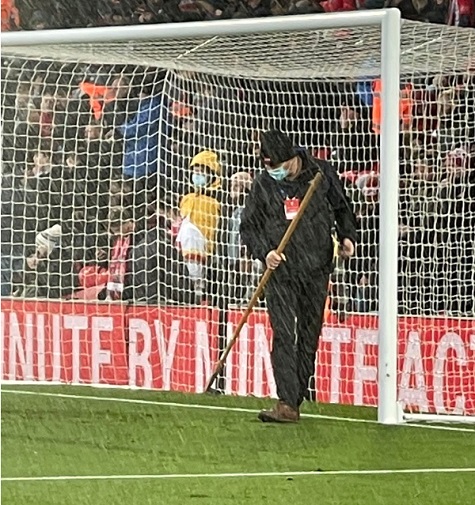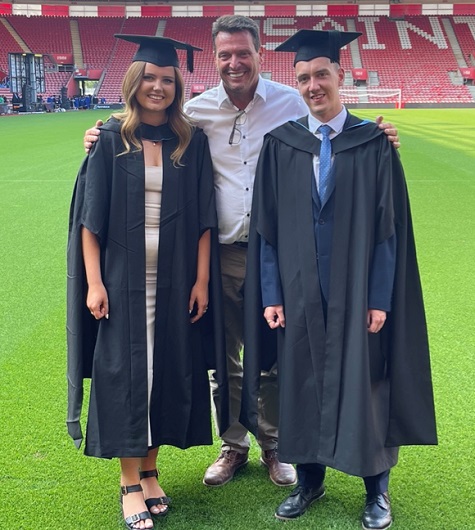
There are many different ways in which we learn throughout our life.
I believe throughout my career I have probably used all of that list of learning methods.
A potted history of David Roberts learning and working career:
Attending a course or learning online
I hated school, couldn’t wait to get home, spent most of my day looking out of the classroom windows! I did OK in sciences, when it came to career choices it was a Pharmacist career recommended, but that required 6 years of further study! Forget that!
I enjoyed working in the garden at home, so the second option was a one-year college course at Rodbaston, learning City and Guilds Horticulture L1 and L2. I loved college, not only was learning fun there was alcohol and women! At that time that was the only horticultural course the college offered. I left and went to work with Staffordshire County Council doing a Youth opportunity scheme. The college then launched a new course, National Certificate of Horticulture a one-year residential course going into a lot more detail in all aspects of horticulture.
Learning through practical experience
Once I left college, I thought I could conquer the world! This was mid 1980’s and Maggie’s Britain had a north south divide. I was on the wrong side of it! I had a spell at being self employed landscape gardener, all the time I was doing this I was keeping an eye on the jobcentre to see if any other careers in horticulture came up. Nothing in a whole year. I visited a friend near Southampton and went into a job centre to see what was there and came out with a job!
I moved South working at Hampshire County Council. I left after 6 months to work for Tonrin contractors, they had a lot of council contracts and MOD bases all over the south of England. They also had IBM Hursley which had 110 acres of parkland, gardens and sports fields. I ended up looking after the two footy pitches, one cricket square and the baseball diamond (well they were an American company). I learnt loads in the three years there. I was on my own with the pitches so had to self-teach, make mistakes and learn quickly from those.
I got moved from Hursley to work on other MOD sites and given charge of a mobile team maintaining a lot of grounds. Tonrin started doing pitch renovations and more specialist work and I was involved when it came to these operations and trusted with some of the new kit that Tonrin invested in.
Teaching yourself
A lucky break in 1994 (being in the right place at the right time) gave me an opportunity to work at Southampton FC, the Dell part of a 3 man team responsible for the training ground as well as the stadium. This was a huge learning curve! First game for me was against Arsenal, when the Bruce Grobbelaar bung accusation was taking place, bags of monopoly money was being thrown around.
I had very basic tools to start with and very little help. I read every trade magazine and book I could find. I picked the brains of every salesman that walked in and pushed hard to learn all I could.

Find a mentor
I picked up the phone and called Arsenal football club very early on when at Southampton. Steve Braddock had won the Groundsman of the Year award and I wanted to pick his brains. This was before mobiles or pagers. The groundsman sheds had a bell on the outside and if you were on a mower on the pitch you never heard it. If you did it was a long sprint to the shed to grab the phone before it rang off. I got lucky, I called the Arsenal switchboard and they put me through to Steve who picked up as he was back at the shed. He was brilliant, welcomed me to the Premier League and asked me to come up to Highbury for a visit. We became good friends and kept sharing ideas and experiences throughout my career up until his unfortunate illness and death. Having a Mentor like Steve was brilliant. He helped me loads and would call me if had a challenge or two.
Compare your work with an expert.
I kept challenging myself throughout my career, whenever a problem came up, I wasn’t sure about I would pick up books, get on the internet and speak to colleagues. This has helped me get through many problems! I kept pushing myself to be better.
Although we never set out to win the Groundsman/grounds team of the year award we always strived to produce the best pitch possible with the time and resources available.
I have been lucky enough to manage the grounds teams at some great venues, 13 years at Southampton FC, 9 years at Charterhouse School and 6 years at Liverpool FC.
Teaching someone else
I left Liverpool FC for a complete change. I moved to Portugal and work with my partner Jan with her company Training Unlimited. One of the challenges I have had with my teams is that there are some great training pathways to become a grounds person but once you are there it isn’t easy to do further learning. I had many of the team at Liverpool looking to carry on learning, but we struggled to find anything.
I decided to build a set of short online training courses around key subjects that would help add further underpinning knowledge around the work we do. When it came to writing my courses and training others, I found it a great way of checking what I knew and putting that into a way others could benefit.
One thing I have noticed moving out of the UK to live and work in Europe, is how much access to training we have in the UK. Much of Europe and much of the world doesn’t have formal qualifications for grounds management. Many grounds staff are regarded as gardeners, not recognising the skills and knowledge. That is changing gradually in Europe.
I have built a range of courses that deliver.
I believe outside our industry is that we are seen as just grass cutters.
Very few people understand our role and the challenges we face daily and yearly. So when it comes to communication and presenting ourselves it is important we convey who we are and what we do and need in a professional manor. So we can communicate with our own team, line managers, players and coaches and external stakeholders.
Learning skills that can make us better communicators and managers is very important.
With our other trainers we can deliver other courses that cover other subjects that are often not taught to us but can be valuable as we progress in our careers.
Is there one pathway I could recommend to follow to get to the top?
No, there are many pathways that can be taken. You don’t have to have formal qualifications however they help prove that you know your stuff. Some employers insist on having them. A lot can be gained from experiences, both good and bad.
However, a lot comes down to hard work, a lot of patience, a bit of luck and a good positive attitude.
The GMA have introduced the Pitch Grading Framework, this can help people see where there surface is, and what knowledge is required to manage it or take the pitch to the next level.
We never stop learning.

David and daughter Grace and her boyfriend Jack graduating Masters in biology and marine biology at Saints FC